The Ultimate New River Gorge National Park Travel Guide

The 72,000-acre protected area, centered around the 1,000-foot-deep New River Gorge, is easily one of the most dynamic units in the park system, and it should absolutely be on your must-visit list this year. (Photo: BackyardProduction/iStock)
I didn’t think my kids would do it. I thought they’d get to the edge of the cliff, harness and helmet on, take a peek over the edge of a 1,000-foot-deep gorge, and back out of their first rappel. They were both only ten at the time; I wouldn’t have blamed them. So it was surreal for me to watch them lean back without a hint of hesitation and push themselves off. Naturally, I was worried something terrible would happen—the rope would fail or an anchor would loosen—but mostly I was just proud to watch them get so far out of their comfort zone.
Maybe I shouldn’t have been so surprised. After all, West Virginia’s New River Gorge has been pushing adventurers beyond their comfort zones since the 1960s, when paddlers first started rafting the Class IV+ whitewater that surges through the gorge. Shortly thereafter, the climbers came, testing themselves on the bulletproof sandstone walls and establishing superhero routes that now top out at 5.14b. Hell, you can even BASE-jump here legally one day out of the year (see Bridge Day, below).
I’ve been testing myself in the New, as it’s affectionately known, for almost two decades. I took my first climbing courses here, struggling up top-rope routes on the picturesque Bridge Buttress. I got lost on a mountain bike trying to link together an epic 35-mile ride from one end of the gorge to the other. The scope of adventure on hand inside this 53-mile-long canyon in the southwestern corner of West Virginia is world class, offering testing grounds for all sorts of athletes. As of December 2020, the New got the recognition it deserves. It was designated our newest national park, becoming the 63rd in the system. The 72,000-acre protected area, centered around the 1,000-foot-deep New River Gorge, is easily one of the most dynamic units in the park system, and it should absolutely be on your must-visit list this year.
What You Need to Know Before Visiting
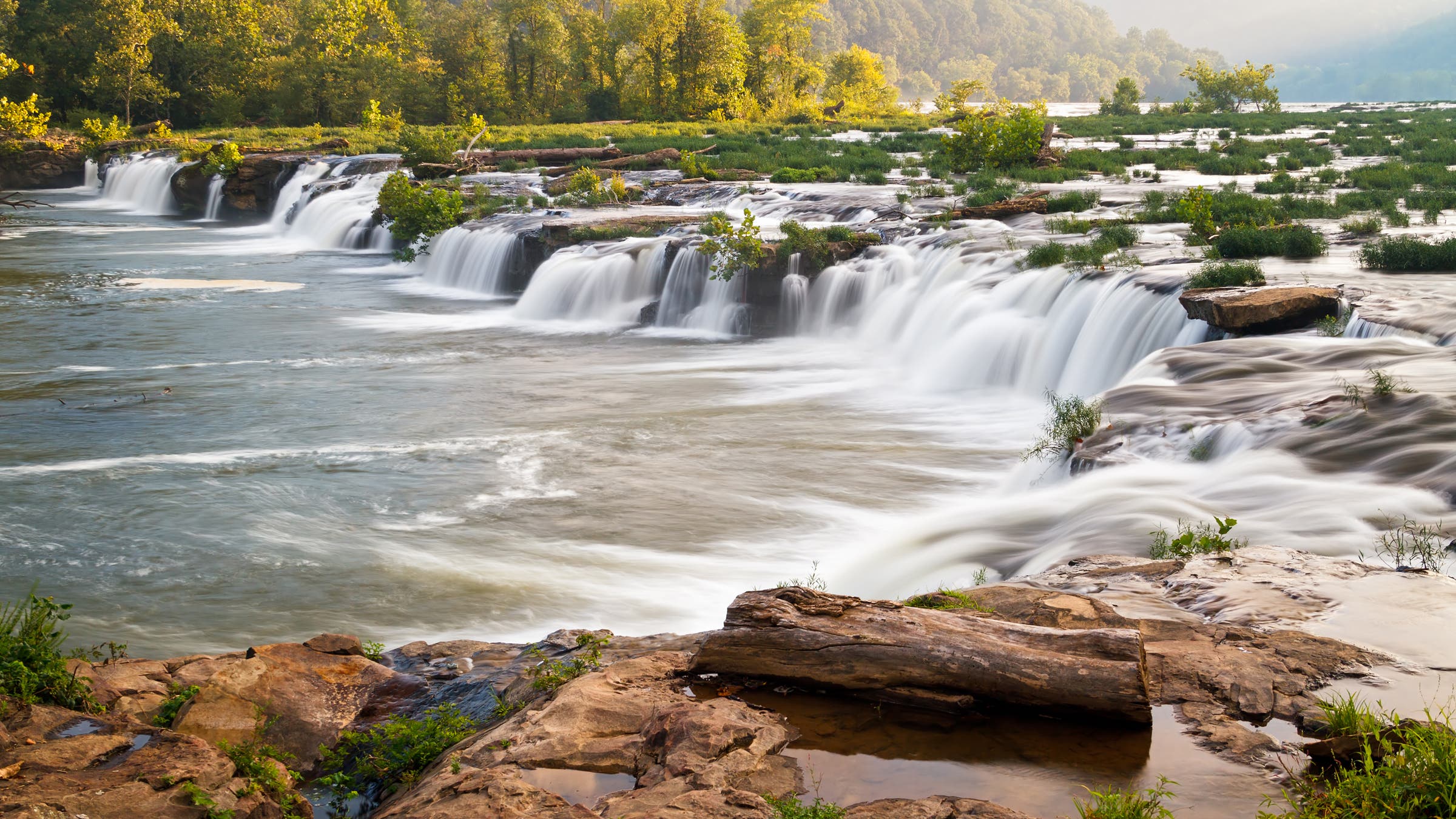
There are no developed lodging options inside the park. I know, it sucks, but the New River Gorge doesn’t have any campgrounds within its boundaries. There also aren’t any cabins or lodges inside the park. You can find some primitive campsites throughout the gorge, some of which are accessible by gravel roads, but they’re first come, first served only and have no water or hookups. Most backcountry camping is located along the river and is accessible only by boat. The good news is that there are plenty of campgrounds and cabins just outside the park on private land.
The New is full of history. The New is not a pristine wilderness like some national park units. The slopes surrounding the New River were logged extensively and mined for coal during the early 1900s. You’ll find remnants of that extractive past all over the park, from rusted cables hiding in the brush to retired mine sites along popular trails. You’ll even find entire mining camps that were abandoned 100 years ago.
Safety first. The terrain inside the park is dramatic, with Class IV+ whitewater running through the center of the gorge and multi-pitch climbing routes running up the canyon walls. With this sort of terrain, it’s easy to get in over your head and find yourself paddling a section of river that’s above your pay grade or clinging to a route that you have no business trying to climb. The best way to experience the New’s gems is by hiring a guide, who will help you avoid crowds and keep you safe while enabling you to push your limits.
Park roads are narrow and winding. Most of the two-lane roads were established decades ago, when cars were smaller and slower, and drop from the rim of the gorge to the river in a series of sharp switchbacks. Don’t hurry, keep your eyes on the road, and leave the trailer or oversized RV at home.
Plan for crowds. It’s still relatively easy to avoid the crowds if you’re hiking or mountain biking, but if you’re hoping to climb any of the New’s signature cliffs, expect to have company. Ditto if you’re paddling the gorge, as put-ins can get gridlocked during summer. Avoid weekends if you can, and pay special attention to annual events that bring particularly large crowds to the area.
How to Get to New River Gorge National Park
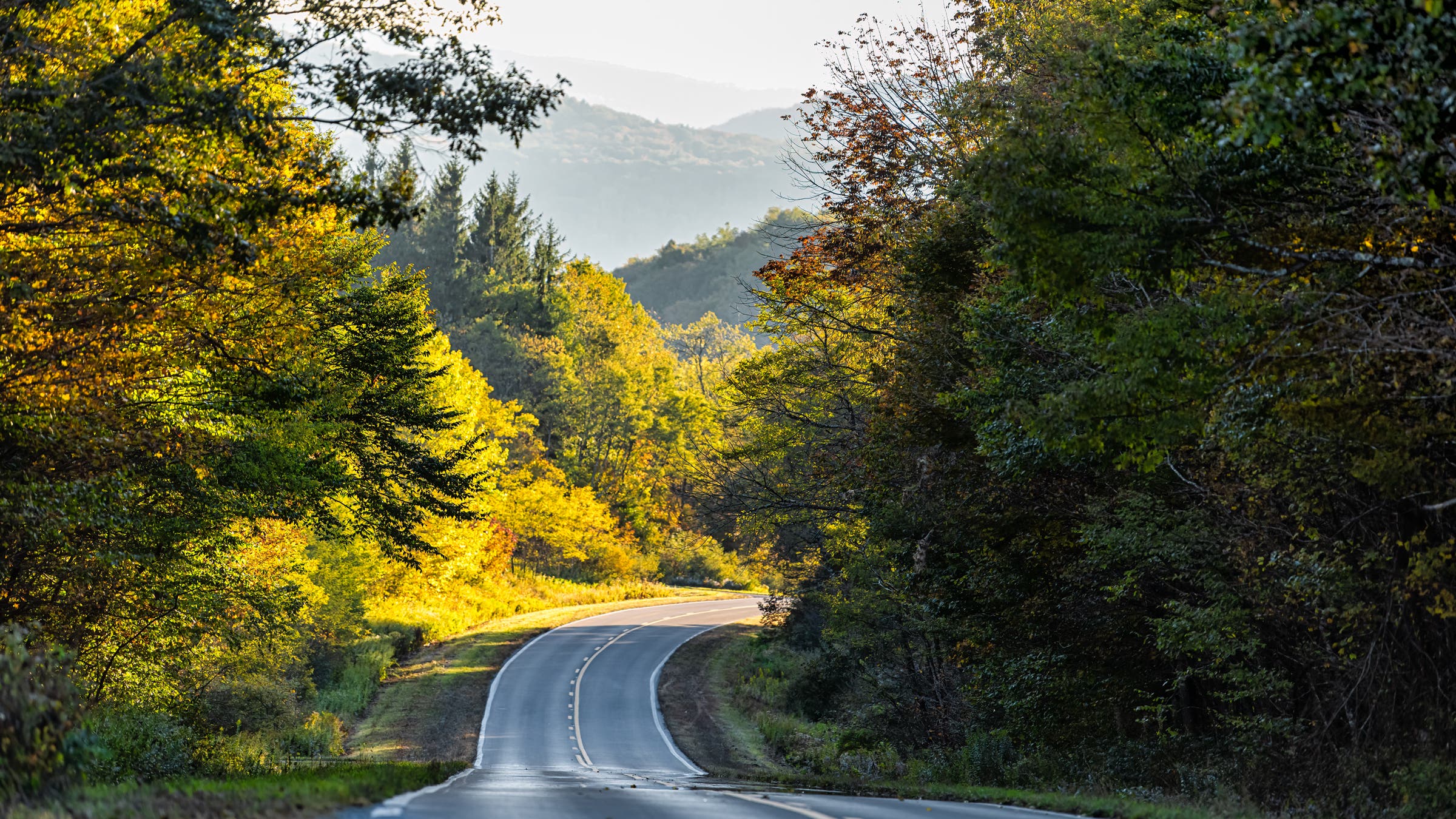
The New sits in southwestern West Virginia and close to a couple of major interstates, which makes it one of the more accessible units in the park system. Most people who visit the park go by car, as it’s only a five-hour drive from Washington, D.C., seven hours from Atlanta, and just over eight hours from New York and Chicago. If you’re flying, the closest major airport is in Charleston, West Virginia, 70 miles to the west. You’re on your own once you get to the park, though; there’s no public transportation within the gorge.
The Best Time of Year to Visit New River National Park
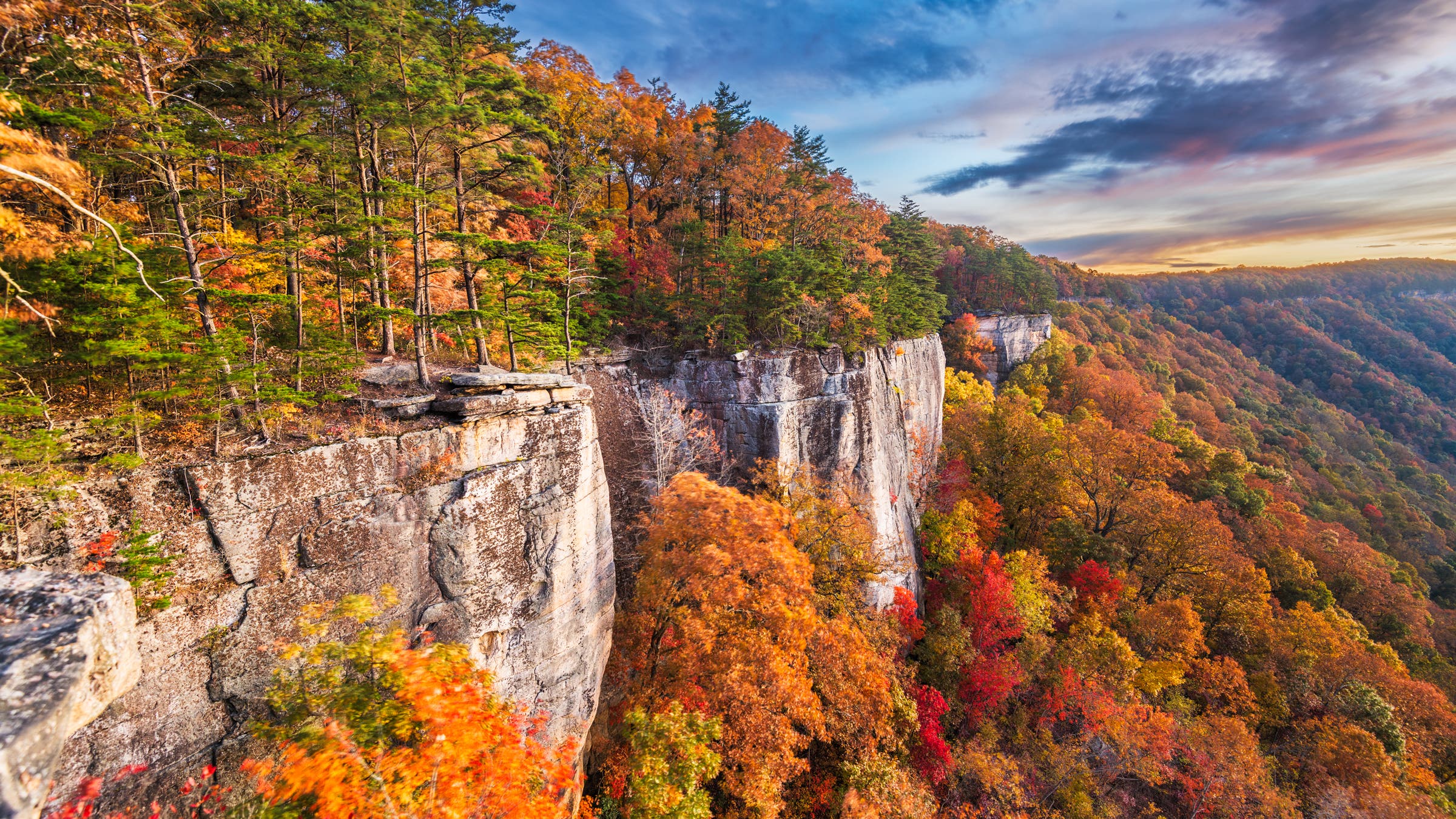
Summer brings the biggest crowds, who come to raft the New and the nearby Gauley River during the warmest time of year, but the park is very much a year-round destination. Winters are mild, and the climbing is arguably at its best during spring and fall.
Winter
The area’s relatively mild temperatures (lows rarely dip below the 20s) and trace amount of regular snowfall mean the park is open during winter. Rafting operations cease, but hardcore paddlers have been known to brave the New all year long. Climbers can choose warmer winter days and have the typically crowded cliffs all to themselves. Kaymoor Slab on the Endless Wall is a particularly good winter climbing destination, because it bakes in the sun all day. Ice climbing can also be found inside the park, but it’s fleeting and infrequent. If you don’t mind being chilly and are averse to crowds, winter might be the best time to visit the park.
Spring
Guided rafting trips typically start on April 1, but the crowds don’t show up until school is out in June. Spring also means higher water levels, so you’ll be rafting bigger waves. You can also find good deals on guided trips this time of year, but it might be chilly—highs in April are typically in the low 60s. The wildflowers are off the charts, too. The New has the most diverse flora of any river gorge in the central Appalachians, with more than 1,400 different plant species. You’ll find trillium, Virginia bluebell, rhododendron, and flame azalea exploding through April and May.
Summer
Peak rafting season brings the biggest crowds through the park. Expect traffic jams at the put-ins, guiding outfitter buses on the roads, and groups of climbers at the cliffs. If you’re looking to hike or mountain bike, make sure you have alternative trails in mind in case the trailheads are full. Temperatures typically reach the high 70s and low 80s, and afternoon thunderstorms are common but usually brief.
Fall
If foliage is your thing, you can’t beat fall in the New River Gorge, as the lush hardwood canopy turns golden shades of yellow, orange, and red, typically peaking in late October. The temperatures are perfect for climbing and mountain biking, and a couple of key events punctuate the season. Bridge Day, in the middle of October, brings hundreds of BASE jumpers to the area, where they can legally jump off the 876-foot-tall New River Gorge Bridge, the world’s second longest arch bridge, parachuting into the gorge below. For many paddlers, Gauley Season is the highlight of the year, as water is released from the dam on Summersville Lake for several weekends in a row through September and October, filling the Gauley River with Class V water.
Where to Stay in and Around New River Gorge National Park
While there is some primitive camping inside the park boundaries, most visitors choose one of the privately owned campgrounds or “resorts” that sit adjacent to the park proper. ACE Adventure Resort occupies 1,500 acres 12 miles south of the visitor center and has its own trail system for hiking and mountain biking, four lakes, and a private beach where rafting trips launch. Choose from campsites to cliffside chalets (campsites start at $15, chalets start at $399). You can also book rafting and climbing trips directly through ACE. On the other side of the park, Adventures on the Gorge is a resort-style cabin getaway with pools, restaurants, and canopy tours on the property. Lodging is varied, from drive-in campsites (from $39) and glamping sites (from $159) to deluxe cabins with private hot tubs (from $299). Just like ACE, Adventures on the Gorge will guide you on a series of adventures throughout the park. The American Alpine Club also has a campground on 40 acres half a mile from the park’s main entrance. Each site has an elevated platform, and there’s a climbing wall and shower house ($20 for AAC members, $30 for nonmembers).
What to Do in New River National Park
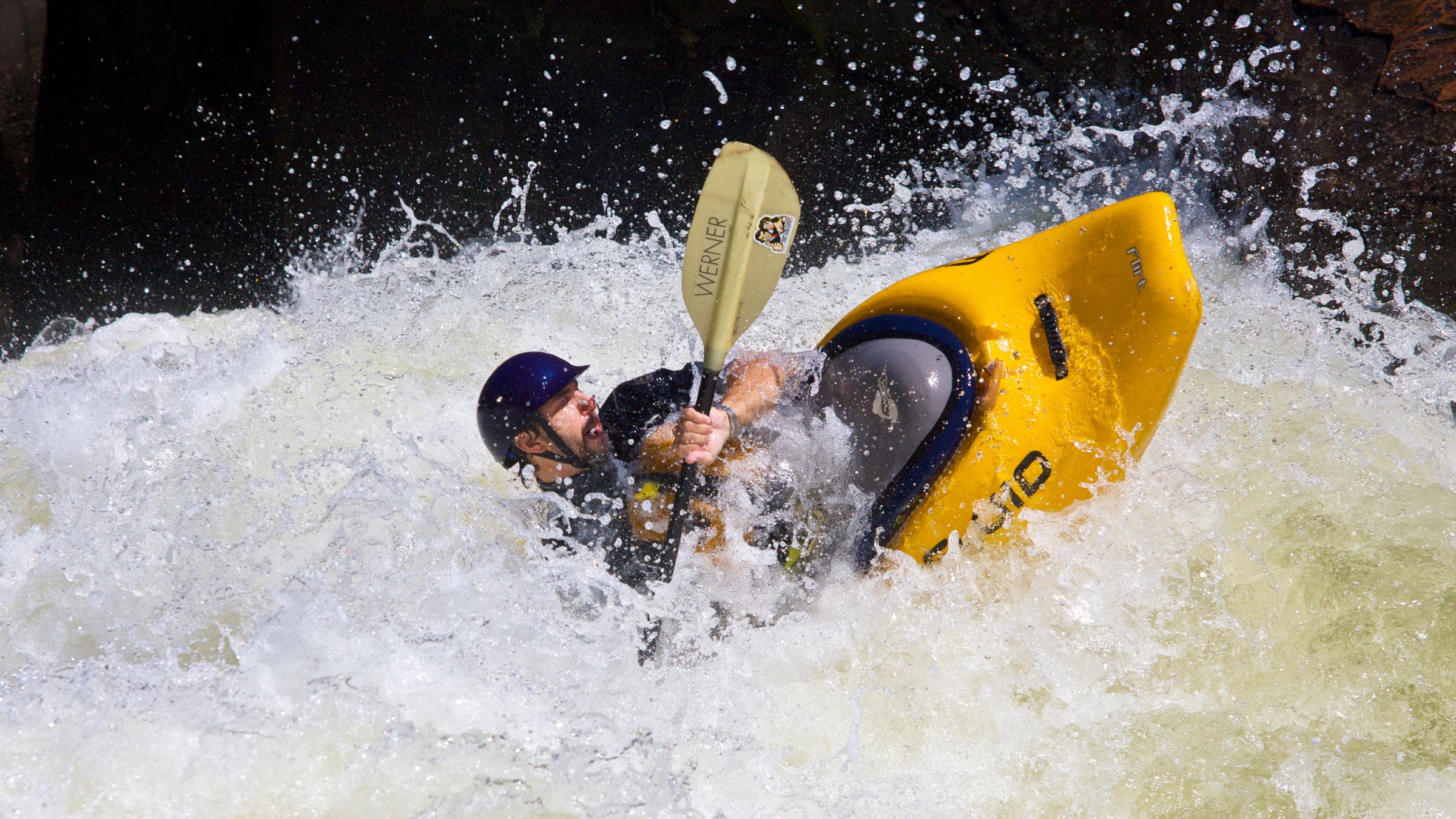
Paddling and Rafting
Whitewater rafting has been a thing in the New since the 1960s, when some college students pioneered navigating the river in rubber boats. Those kids eventually founded whitewater rafting companies in the gorge and the sport exploded in the 1970s and ’80s. Paddling the 53 miles of whitewater inside the gorge is usually broken up into two big sections, the Upper New and Lower New. Families and beginners will find easier whitewater in the Upper New, which offers 13 miles of Class II whitewater and the occasional Class III. Expect lots of shoals and waves, with long eddies between rapids. If you go with a guide, you can choose between two-person duckies and full-sized rafts. It’s a full-day wilderness experience through a rugged section of the gorge without much evidence of human disturbance. For bigger whitewater, the Lower New offers more than 25 rapids within a 14-mile stretch for a full day of big Class III–IV+ rapids. Big wave trains are broken up by perfectly timed eddies, but expect nearly nonstop action with the occasional break for a rock jump thrown in for good measure. Long wave trains, big pillow rocks, surfing waves—you get it all in the Lower, and the trip ends below the New River Gorge Bridge. If you have the time and energy, most guide companies offer the chance to combine certain sections of the New for multiday trips that have you camping on riverside beaches overnight.
Climbing
The New started attracting rock climbers in the 1980s, and momentum hasn’t let up since. There are more than 1,500 routes (and counting, as climbers continue to explore) on the gorge’s tall sandstone cliffs, not to mention the ever-expanding bouldering scene within the park. The area is rapidly becoming one of the eastern seaboard’s best rock-climbing destinations, with some beginner-friendly top-rope routes in the 30-foot range and a bevy of multi-pitch trad and sport lines that rise 120 feet. The majority of climbing is on the advanced side (5.10+ climbers will have plenty to choose from and be able to avoid most of the crowds). But there are a few locations with 5.7 top-rope routes. Your best bet if you’re new to the sport is to book a guide with New River Climbing, which will lead you to easier gems like the Cave Routes, a sloping wall inside a cave on the edge of the Junkyard Area. The Bridge Buttress, near the Canyon Rim Visitor Center, also has some milder routes and easier access. There are also plenty of easier climbs just outside of the gorge, such as the waterside cliffs that line Summersville Lake, 18 miles northeast from the park, where you can climb using a pontoon boat as your belay station.
Intermediate and advanced climbers will get the most out of the New, because the majority of options fall in the 5.10 to 5.12 category. The Endless Wall has a lifetime of routes with almost three miles of unbroken cliff line offering 100-foot-tall sport and traditional routes galore. And you’ll find twice as much cliff if you explore beyond the main area of Endless Wall. Show up early to avoid standing in line for classics like the 5.9 Fool Effect, one of the longest single-pitch sport routes in the gorge, and Aesthetica, an 80-foot 5.11c sport route with plenty of room for interpretation for creative climbers. Keep in mind that Endless Wall is accessed by a popular hiking trail, so you’ll have mixed traffic while you’re climbing.
Mountain Biking
The park is one of few that allow mountain biking on singletrack inside its borders. And the riding is good, thanks to a purpose-built trail system that was created largely by the Boy Scouts. The Arrowhead Trails is a 12.8-mile stacked loop system of flowy, narrow singletrack with options for beginner and intermediate bikers. You’ll cruise beneath the hardwood canopy for the majority of this ride, but the network’s Dalton Trail does offer the occasional shot of the gorge through the trees. The riding isn’t terribly technical, but the corridor is tight (watch those wide handlebars), and you’ll find the occasional rock garden to spice things up. You can also piece together an all-day epic that joins historic paths through the gorge that pass by some impressive coal-country history with Arrowhead and the Fayetteville Trail, which connects the small town of Fayetteville with the gorge proper. It’s a big 30-mile ride that takes you on a tour of the best fat-tire terrain in the area. The Arrowhead Bike Farm and Campground has beta on all the trails, as well as beer and camping.
Day Hiking
Unlike most national parks, hiking is just an auxiliary activity in the New, but that doesn’t mean the trails aren’t stunning. There are more than 100 miles of paths, most of which are designed for day hikes. Get the perfect perspective of how the area’s mining history coincided with its natural history on the easy 1.6-mile Long Point Trail. It ends at the top of a rocky crag with a view of the New River Gorge Bridge, the second longest arch bridge in the world, which spans the width of the canyon.
The 2.4-mile Endless Wall Trail is another family-friendly option that wanders through a hardwood forest before meeting up with a cliff band on the western rim of the gorge. Metal ladders along the trail give climbers access to the sandstone cliffs below, while hikers are in it for the long-range views of the gorge. If you don’t want complete the entire trail, hike halfway to Diamond Point Overlook, a rocky outcropping that juts out over the New River, 1,000 feet below.
Get a sense for the industrial history of the gorge on the 0.6-mile Kaymoor Miners Trail, which drops almost 800 feet via a series of steps on its way to the shuttered Kaymoor Mine, which was one of the most productive coal mines in the area at the turn of the 20th century.
Explore the belly of the gorge on the 5.7-mile Glade Creek Trail, which follows an abandoned narrow-gauge railroad next to Glade Creek as it drops almost 900 feet in elevation from the top of the gorge to the bottom. Waterfalls and swimming holes can be found as the creek gathers steam on its journey toward the New River, making this an ideal full-day adventure. Stash a shuttle car at the lower trailhead if you don’t want to tackle an almost 12-mile out-and-back.
The Best Places to Eat and Drink Around New River National Park
The small town of Fayetteville (population: 2,806) sits on the southeastern edge of the New River Gorge’s border and has all of the charms of a typical national park gateway town but without any of the cheese factor—no roller coasters or miniature golf here. The town isn’t much bigger than its historic square but has a food and beer scene that exceeds expectations. The Cathedral Cafe has been an institution in town for decades, pulling in ingredients from local farms to produce breakfast and lunch staples, like the spicy breakfast burrito with local chorizo, all served in a former downtown church. Pies and Pints has been the social hub of Fayetteville for just as long. Its tap list is extensive, and the pizzas are creative, to say the least. Grape and gorgonzola on your pie, anyone?
West Virginia was slow to adopt the craft beer movement, but thankfully the brewing scene in Fayetteville has picked up the pace in recent years. Bridge Brew Works opened a new taproom on the south end of town—try the Crux Kolsch for a summer-friendly beer. Meanwhile, Freefolk Brewing makes killer IPAs and has a popular outdoor beer garden on the edge of downtown.
If You Have Time for a Detour
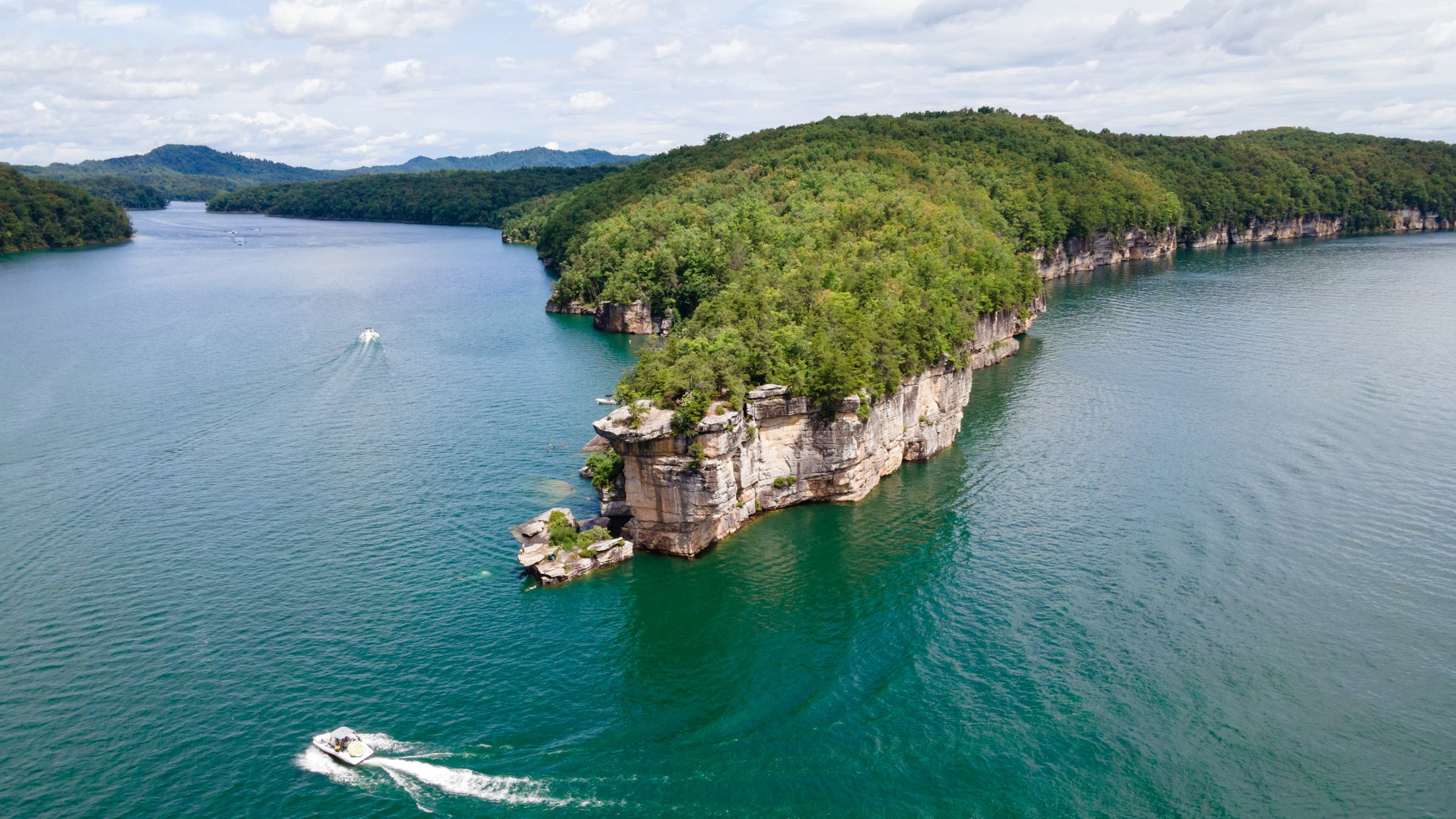
The New River Gorge might be the crown jewel of adventure destinations in West Virginia, but it’s not the only spot worth exploring in this corner of the state. The 2,700-acre Summersville Lake sits at the head of the Gauley River and has 60 miles of shoreline, most of which is lined with sandstone cliffs that make for good climbing. It’s also a primo standup paddleboard destination, with a number of small rocks that are perfect for jumping; rent a board from Mountain Surf Paddle Sports for $35 a day. If you’re looking for bigger whitewater, the Gauley River National Recreation Area has 25 miles of classic big-water waves in the Class II–V range. The 12-mile Upper Gauley is remote and packed with more than 50 rapids in an almost nonstop roller coaster of whitewater.
How to Be a Conscientious Visitor
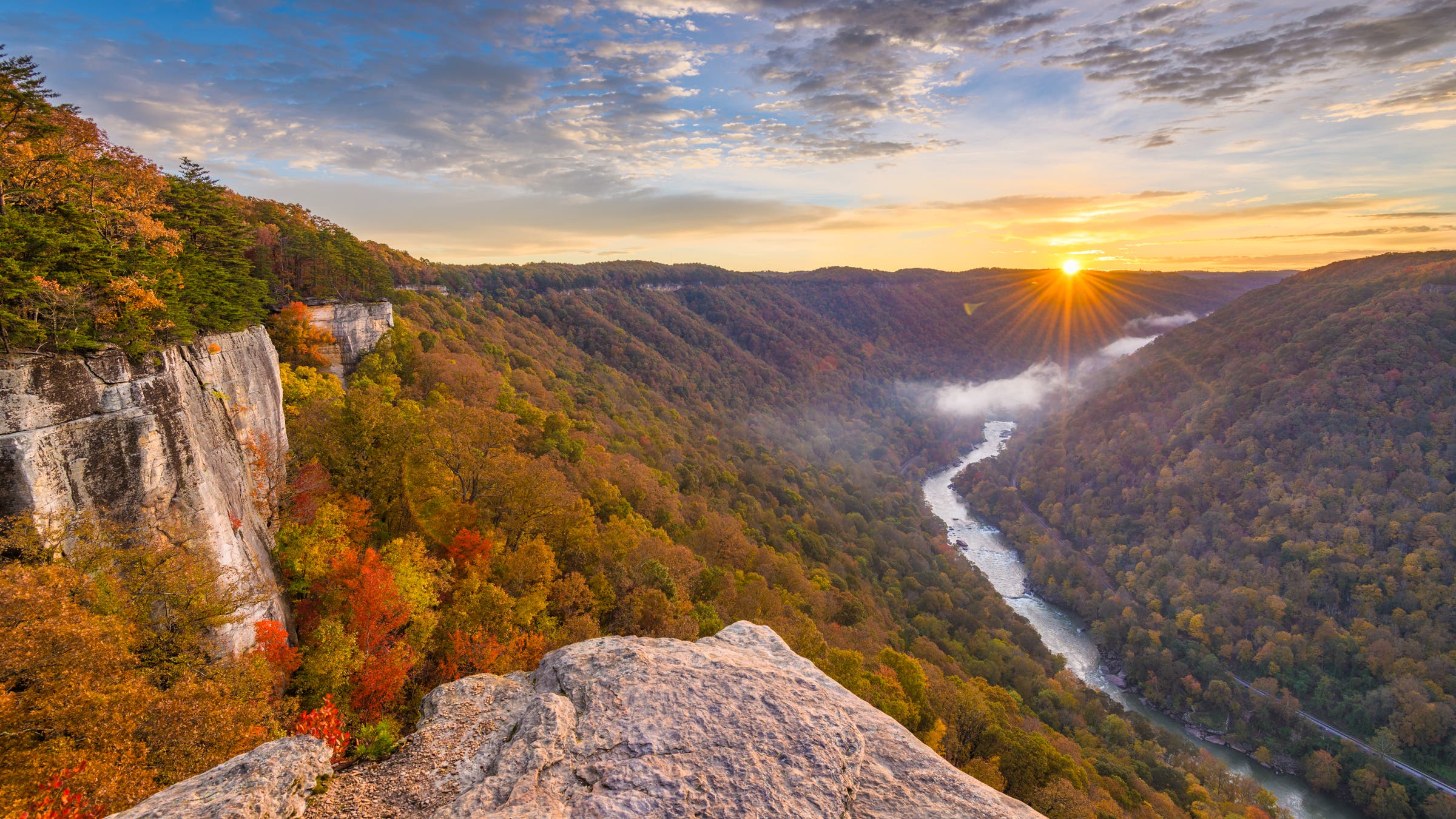
The New has layers and layers of human history that can be explored within the park boundaries, with abandoned coal mines and entire towns being swallowed by the gorge’s lush forest. You’re welcome to explore the remnants of that past within reason—stay out of the mines, and leave everything where you find it so others can have a similar experience. There is also still quite a bit of private land surrounding the park. Some landowners have trail systems that are open to the public, and some do not. Respect the property owners and only venture onto land you have a right to visit. Hunting is also allowed in much of the national park and preserve land. Designations typically keep hunters and hikers separate, but be mindful if you decide to explore beyond the most popular areas.
Gaia GPS is a part of Outside Inc., the same company that owns Outside magazine and Outside Online. If you join the Outside+ membership program, you’ll gain unlimited access to all of our stories, along with the ability to download maps from Gaia to use offline and more. Learn more about Outside+ here.